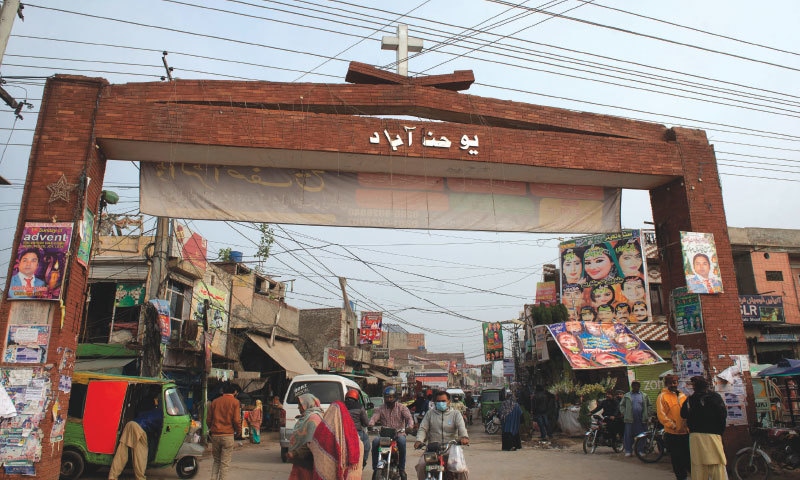By: Kashif Nawab
In Lahore’s largest Christian community area, Youhanabad, grave challenges persist due to widespread environmental crimes fueled by government negligence. Illegal dumping, a poorly managed drainage system, and sewage canals overflowing into residential areas plague the community. Compounded by low socio-economic status and limited awareness, residents endure prolonged suffering, grappling with air, soil, and water contamination, alongside a surge in skin and stomach cancers. The situation exacerbates during rainfall, as toxic materials from industries, household waste, and illegal dumping overflow, reaching residents through stray animals, vehicles, and pedestrians.
Climate Activist Saima William and Program lead of Climate Action Program at Center for Peace and Development Initiatives (CPDI), underlined the impact of industrial toxic substances on the nearby Christian community, including children with a pressing concern. Industries operating in this vicinity release toxic substances into the surrounding water streams and emit gases into the air, especially during nighttime, exacerbating the risks faced by the residents, she added
Pointing at the Respiratory Health Challenges caused by the open dumping’s and overflowing sewage water and waste from the canals, she added that the emission of pollutants into the air, including particulate matter and harmful gases, poses a significant risk to the respiratory health of children in Youhanabad. Elevated levels of pollutants can lead to a higher prevalence of respiratory issues such as asthma, bronchitis, and other respiratory infections.
Highlighting the Neurological Impacts, she added, that Children in Youhanabad are particularly vulnerable to the neurotoxic effects of industrial pollutants. Exposure to these substances may result in developmental delays, cognitive impairment, and behavioral issues, affecting their overall well-being and educational prospects.
Underling the causes of waterborne health risks, she told that, the release of toxic substances into the water streams in and around Youhanabad poses a serious threat to the health of the community, especially children who may consume contaminated water. Waterborne diseases and long-term health consequences are a significant concern.
Commenting on the Cancer Risk for the nearby residents, she articulated that, the carcinogenic nature of certain industrial pollutants increases the risk of cancer among the residents, including women and children. Prolonged exposure may lead to a higher incidence of cancer, adding to the health challenges faced by the community, she stated
Underscoring the vulnerability of the Christian community in Youhanabad, she told that, these residents are already facing socio-economic challenges, are disproportionately affected by the health hazards associated with industrial pollution. Limited access to healthcare resources further compounds the impact on the overall well-being of the community, especially children. The health issues arising from exposure to toxic substances place an additional economic burden on families in Youhanabad. Increased healthcare costs and potential loss of income due to health-related concerns contribute to a cycle of poverty, further marginalizing the vulnerable community, she added
Climate activist, addressing these challenges stressed on the urgent intervention, including stricter industrial regulations, regular monitoring of emissions, and targeted community awareness programs. Collaboration between industries, governmental bodies, and local community leaders is essential to safeguard the health and well-being of the vulnerable Christian community in Lahore, she recommended
Naeem-ud-din, an educationist based in Lahore, underlined the critical situation faced by more than vulnerable school going students of Youhanabad. He told that there are almost 150 schools in the area, accommodating approximately 15,000 students. He also highlights the direct impact of poor sewage management and canal overflow on the students’ daily lives.
According to Naeem Deen, the consequences extend beyond mere inconveniences as students not only face the risk of accidents due to slippery roads but also contend with infections when exposed to toxic materials present in the canal polluted water.
Moreover, he underscored the role of governmental neglect in contributing to numerous road accidents, urging authorities to take immediate and serious notice of this major environmental crisis. Naeem also emphasized that these issues are not only affecting the vulnerable students, who represent the future of the nation, but also pose a significant threat to the well-being of their own community.
President of Pakistan Medical Association, Dr. Ashraf Nazami, commenting on the situation stressed upon the duty of public health departments to discourage residential development and societies near canals and factories, citing severe implications for residents. He highlighted that impoverished individuals, vulnerable to such dangers, often choose these areas due to affordability and accessibility.
Dr. Nazami stressed the need for authorities to control such settlements in the future to prevent loss of lives. Addressing the responsibility at hand, he expressed concern over numerous residential societies located near environmentally hazardous areas. He asserted that it is the state’s responsibility to develop these regions with climate-friendly infrastructure, preventing the penetration of dirty water and sewage waste into residential zones and roads.
Furthermore, he warned about the serious health repercussions, including skin and stomach diseases, resulting from the penetration of sewage water in two water pipeline and storage tanks. He also underscored the link between sewage and industrial toxic water entering the farm and fields becoming the major cause in the rise of cancer cases.
Former Union Council 245 Lahore leader, Tariq Javed Tariq, urgently addressed environmental concerns arising from open sewage canals carrying community waste, stressing the need for immediate intervention. He highlighted the perilous implications for Lahore’s ecological balance and the health of its citizens, calling for swift measures to mitigate potential damages.
Tariq’s impassioned plea extended to the specific challenges faced by Youhanabad, emphasizing the distress caused by canal sewage inundation in poorly conditioned residential societies during rain. The local leader, urged the government authorities to take serious attention and proactive measures towards these cases of mere neglection affecting the lives of the vulnerable citizens. He stressed upon the urgent need for environmental rectification in the Lahore city.


